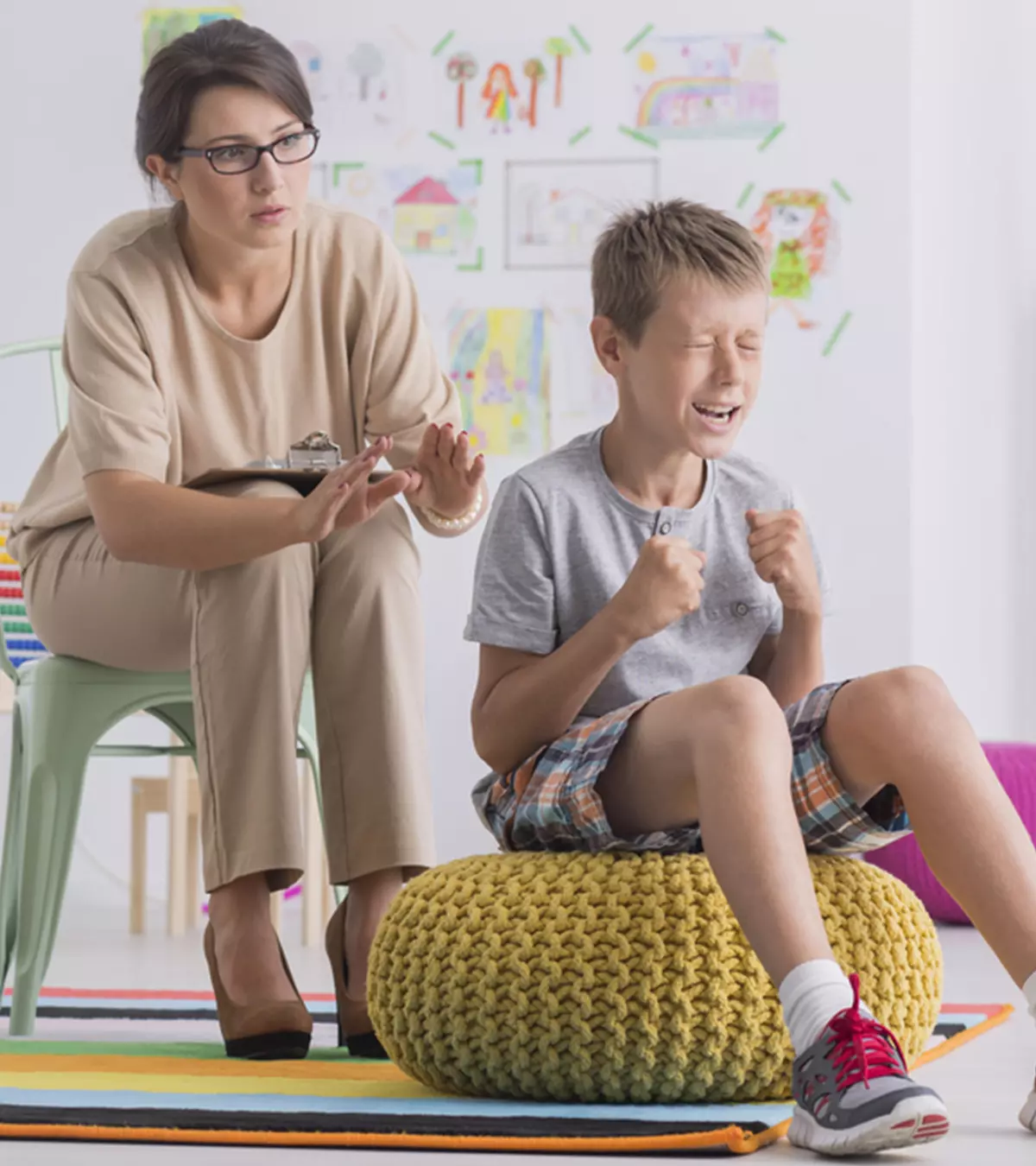
Image: ShutterStock
A manipulative child often exploits situations or people to get what they want, be it their favorite food, toys, or attention and praise from parents, caregivers, siblings, and friends. Both psychological and emotional manipulation may be done to gain control over someone or make someone give in to one’s demands using skillful tactics.
Sometimes, the manipulation may be verbal, such as when children purposely accuse you of not being caring and loving enough. However, at other times, a manipulative child may use other tactics such as making you feel guilty or doing a favor so that you feel obliged (1).
Read this post to understand the common traits of a manipulative child and some valuable tips on dealing with or managing a child’s tricky, manipulative behavior. Knowing these traits can help you be aware and not give in to their manipulative behavior.
Key Pointers
- If your child throws tantrums, has a short temper, has emotional outbursts, or you have caught them lying too often, then these are signs that they are manipulative.
- Some ways to help them overcome this behavior are by helping them deal with stress, rewarding them for good behavior, and setting clear rules.
- Be a role model for your child and plan some goals for them to achieve.
Signs Of A Manipulative Child
The signs of manipulation are often subtle and not straightforward, and it’s not easy to pinpoint if someone is controlling you. However, some common signs may indicate your child is manipulating you (1).
1. Emotional outbursts

Some children do not take “no” for an answer. When you do not grant their requests, it can make them highly exhausted. Such children can go out of control and find it challenging to handle their emotions, resulting in sudden outbursts, rudeness, shrewd behavior, crying, or aggression in kids. While such emotionally intense behavior of the children may cause parents to opt for punishment, it may also confuse the parents and make them oblige to the child’s request.
 Research finds
Research finds2. Temper tantrums
Another common sign of a manipulative child includes throwing temper tantrums. It is characterized by intense anger outbursts for a short period or until they have succeeded in getting what they want. They may resort to yelling, “I hate you,””You are the worst parent ever,””I don’t want to live with you anymore,” etc., or lay down on the floor of the toy store and cry out loud to get an expensive toy. Temper tantrums are common in young children, but you might want to step in if the child’s behavior becomes repetitive (2). According to the CDC’s National Center for Health Statistics (NCHS) data, children between the ages of six and eleven years showed higher rates of behavior problems than children below six and over eleven years (6). Boys were found to have double the estimated prevalence of behavior problems compared to girls. Address these behaviors early to prevent long-term or short-term behavioral issues.
3. Lying
Usually, to get something more from the parents, the child might resort to lying and playing the victim card to let others know that their parents are not good enough. This deceitful and crafty move on the child’s part can force parents to provide more than necessary to the children.
Besides these, the child might also resort to the following behavior.
- Guilt-tripping someone to do something for them.
- Gaslighting someone or making them doubt their own judgments in an artful and wily manner to avoid detection.
- Emotionally blackmail by appearing sad, hurting, and disappointed and may even say phrases like, “You don’t love me anymore.”
 Point to consider
Point to considerReasons A Child Becomes Manipulative
Manipulative behaviors in children may emerge as a result of age or environmental influences (7) (8) (9) (10).
- Asserting power: As they grow older, children may turn to manipulation to assert their power and authority, especially in environments where they feel ignored. They may attempt to subjugate others and break down interpersonal relationships to feel in control of their own and other people’s lives. For instance, a child who wishes to assert their authority may bully people into befriending them and dictate their friends’ appearance, friendships, and academic responsibilities at school.
- Avoiding punishment: Children engage in manipulation out of jealousy or out of the need to escape punishment. They may resort to lying and blackmailing when they feel frustrated or unsafe. Sources indicate that this may especially be true in the case of overprotective parenting, where children grow up in a system that rewards acceptable behavior and punishes the rest. Such a system may push children to find ways to avoid punishments and also make them envious of those who do not face similar predicaments at home.
- Gaining parental participation: Some children may indulge in manipulative behavior to meet their basic needs as an effect of learning. They may throw tantrums, exhibit manipulation, and try pseudo-crying as a means to get what they want, as they likely received reinforcements for the same as an infant. For instance, a child who received negative attention for every time they hit and no attention or appreciation for every time they were well-behaved may resort to hitting as a means to gain attention. Alternatively, a child who received any object they wanted by throwing tantrums in shops and receiving nothing when they politely asked may indulge in more tantrums.
- Negative role models: A common belief system among clinicians suggests that children learn certain behaviors through observation and imitation. Studies indicate that parental behavior patterns such as guilting, belittling, shaming, withdrawing affection, sarcasm or wounding remarks, abuse, neglect, and discounting ideas can negatively affect a child’s psyche. According to Professor Craig H. Hart, such manipulation forces a child into submission without exemplifying what good behavior looks like. He says, “As they focus on trying to comply with a parent’s psychological demands, they have a hard time learning inward control. They don’t learn how to regulate their emotions and their behavior from the inside rather than from external pressure, and that makes for a difficult adjustment to adulthood (9).” Thus children may learn to imitate their role model’s ways to garner attention, affection, and empathy.
Ways To Deal With Or Manage A Manipulative Child
Here are some well-researched parenting strategies to manage and discipline your child’s devious behavior. These tips will also help your disobedient child become more persuasive without resorting to Machiavellian and calculating tactics (7) (8) (9) (10).
1. Set some goals
Setting goals is crucial to achieving any target. At times, children are bound to use manipulation to get what they want. However, if you feel their behavior is becoming repetitive, try to set specific goals for them.
For instance, you could challenge the child to patiently wait for seven days for a specific request of theirs to be heard. This would help the child pause and control the urge to do something spontaneously. One week can do wonders for the child’s temperament, and it shuts the door for scheming, manipulation, and immediate gratification.
2. Create an action plan

An action plan is something that you can let your child follow whenever they need attention or request something. This action plan should be prepared considering your family values and desirable personality traits. Here’s an example of an action plan that you could customize for your child.
Stay silent for at least 60 seconds after requesting something.
Ask again after 60 seconds if you do not receive a response.
Mention why you would want someone to accept your request.
Listen to the other person’s reasons.
An action plan can be prepared based on the goals planned in the previous strategy. Pick an action based on the written goals and ensure the targets, that is, healthy and desirable behaviors that the child must show, are doable. You may pin the goals and actions plans on a wall or refrigerator to remind the child of the appropriate and expected ways to request something and get something without showing untrustworthy and sly or sneaky behavior.
Use your creativity and consider the child’s interests and personal preferences to add to the list of goals and actions. Any action that is comfortable to do for you and your child will help modify the child’s behavior realistically and quickly.
 Quick tip
Quick tip3. Distract the child
Using distraction is another excellent way to manage children’s manipulative and mischievous behavior.
Several studies suggest that young children have the ability to adopt simple coping mechanisms, such as engaging in play or thoughts that distract them, when faced with delayed gratification (3).
The idea is to find a few distracters that fit the sensory modalities of the child, and you can always create your list by exploring accessible options.
Visual distracters can be anything that a child finds interesting and pays attention to for a few minutes. The visual stimulus may range from an attractive image of a favorite colorful animal or a cartoon character.
Auditory distracters include sounds and voices of something different than the regular sounds the child listens to; for example, a piece of unique and calming music or the sound of a bird.
Tactile distracters include living or non-living objects that offer stimulation. Touch is a powerful distracter that immediately gives a warm feeling, and there are many ways to use this powerful tool. Shake both hands of your child while maintaining eye contact, press the back of their hands with your thumbs, or massage them with a warm cloth or cold water bottle depending on the temperature.
You can always combine different modalities to raise the efficiency of this method. The other two sensory modality-based distracters are smell and taste. These can also be utilized based on one’s preference and availability of resources.
4. Be a role model
Shaping others by projecting oneself as a model to follow is a common and effective strategy. We, as human beings, learn to behave by observing others, a process also called social learning.
The parents can present themselves as role models and show the child how to be patient when they need something from someone. They can do a role-play in front of the children to teach them the appropriate way to wait for something upon request. This method is effective for teaching social skills, communication, empathy, self-control, and much more.
The parents can also adopt an indirect role modeling method such as showing a video or narrating a story that includes lessons on manipulative behavior management. The video or story would contain characters that are separated from the child’s identity, thus helping you avoid blaming and shaming while teaching them that being cunning and dominating is bad.
5. Participate and instruct

Guided participation is when the children and parents learn something together. This can be made possible by reading a story together or role-playing. Role reversal is a form of psychodrama that allows children and adults to express their feelings, gain insights about each other, and encourage and practice good behavior. This is also an opportunity for the parent to view the world from the child’s perspective and strengthen the parent-child relationship.
Use a variety of activities for this purpose. For instance, you could write stories, do meditation and mindfulness activities, do physical activities such as dancing, draw different characters, or recreate a situation using dialogues.
The parents’ actions in this method are crucial and can help build self-esteem in children. Make sure children speak and act more than you, and you listen patiently rather than reacting at once. Your choice of words and how you show patience when doing these activities together can go a long way in teaching your child how to behave.
6. Set clear rules
Rules do not need to be strict enough to restrict the child’s thoughts and actions. Set flexible rules for all family members, and let them know what they should and shouldn’t do. The rules can be written in this structure:
- Everyone can ask for an extra snack only once a day.
- If someone asks for an extra snack twice a day, they can ask for it again only after two days.
- If someone asks for an extra snack more than twice, they need to wait for a week before making another request for an extra snack.
These are simple but clear instructions to set boundaries and can be placed in the dining area. Similarly, other rules can be made using a similar strategy to let children make logical decisions. This also teaches them responsibility, and the chances of throwing tantrums become much lesser.
7. Provide realistic rewards
Offering rewards, both tangible and intangible, when your child displays good behavior or is able to control their manipulative behavior can also provide positive reinforcement. The rewards must be predictable and clearly stated to motivate your child to learn self-control and patience. An example of a reward list can be:
X will receive an extra hour to watch cartoons on Sunday if they do not behave in a certain way for four days.
You can make a reward list for every child and modify the rewards or frequencies based on each child’s interest and motivation level.
8. Provide opportunities for catharsis
Catharsis is the psychological process of releasing distressful and negative emotions to lessen the burden from our soul. Everyone needs it at some point. When people keep their feelings to themselves, they often find it hard to get away from them and end up in outbursts that can harm them and others around them.
There are several ways in which you could help your child pour out their pent-up emotions or express themselves freely. Here are a few.
- Play a verbal game with your child where each of you names something that annoys you or shares an incident that has hurt you.
- Ask open-ended questions as it allows children to share a lot more. Make a list of such questions, and feel free to ask them any of these questions daily when the child is relaxed.
- Another idea is to write a letter to someone without sending it to them. Fill the letter with all the disturbing thoughts and expressions that the child would like them to know and discard the letter, burn it, or tear it into small pieces.
9. Engage them in journaling

This approach focuses on maximizing the child’s mental health. Journaling involves writing down all your thoughts and feelings, both good and bad. This is an excellent way for your child to stay positive and purge themselves of all the thoughts and feelings that that are holding them back. A few things that they could include in the journal to start feeling positive include
Three compliments someone gave me
One person who always supports me
Two people who always help me
Ask your child to set a time to reflect on their day and maintain a colorful journal to remember and record the happiness and pain they experienced. They could also write down what they did for others during the day, such as
- Appreciated someone’s effort
- Praised a friend
- Offered a helping hand to a neighbor
10. Help them manage stress
Stress and anxiety usually triggers a child or anyone to show anger and display irritable behavior. And the triggers of stress can be anything, from objects to timings, places, people, and events, which may cause the child to kick off. To avoid the activation of the child’s manipulative acts, try to create a relaxed atmosphere at home. You could also learn more about stress in children and some coping skills to help your children face any situation.
11. Engage them in healthy family activities
Involve your child in planning daily meals, weekly activities, and leisure time to strengthen your bond and build a deep and strong relationship with them. You could also do various activities together after school and during the weekends.
12. Encourage open communication and teach empathy
Open communication with children will build a stronger connection between you and your child, thus fostering honesty. Teaching them to be empathetic will make them understand others and be considerate about their feelings.
Frequently Asked Questions
1. What creates a manipulative child?
Children may manipulate and be sneaky instinctively to get what they wish for. They may also learn it from their parents or someone in their family. Encouraging manipulative skills and getting things done as the child wishes can worsen the manipulation over time.
2. At what age are kids manipulative?
Kids can be manipulative from a very young age, such as infancy and toddlerhood. Young children may cry to seek parents’ or caregivers’ attention without reason. However, more complex manipulative behavior is seen in older children when they can logically reason and make the parents or others get things done in their way.
3. How do you correct a manipulative child?
You may respond to a child who is manipulating but does not react in the way they wish to. You may tell them it is better to say things to the point or mention their needs than reasoning. Never get emotionally blackmailed with a child, since once it is successful, they tend to try it again. You may also avoid negotiating with them. You may also cut down some age-appropriate rewards such as using a phone or watching a show whenever they try to manipulate you. This may help them be more accountable and avoid manipulation in the future.
4. Are children with ADHD manipulative?
According to Robyn D Rausch, LPC-S, RPT-S, a therapist from Houston, Texas, who works with kids and families, “ADHD kids are further from manipulation than the average child. Because of their executive function deficits, they struggle to meet their connection needs and also need more emotional co-regulation from adults. This results in behaviors that are difficult for adults because the child is desperately trying to meet their needs and trying to get adults to help them meet these needs.”
A manipulative child may use different strategies to make you give in to their demands. Dealing with a manipulative child may be difficult, so it is important to check their challenging behavior. They may try lying, crying, and showing temper tantrums. Try to make them see things clearly by setting definite goals, distracting the child, and being a role model to make them stay away from manipulation. However, if the issue persists, take your child to a professional as they can guide you the best.
Infographic: What Not To Do While Dealing With A Manipulative Child
If nothing seems to work with your child’s manipulative ways and you end up giving them what they want because you cannot deal with their crying and tantrums anymore, you may not be handling it right. Check this infographic to understand the common mistakes parents make while dealing with a manipulative child and make sure to avoid them.

Illustration: Momjunction Design Team
Illustration: Signs Of A Manipulative Child & 11 Ways To Deal With Them

Image: Stable Diffusion/MomJunction Design Team
Does your child’s manipulative behavior worry you? Fret not! Gain insights into managing your child’s challenging behavior and avoid feeling manipulated with the guidance provided in this video.
References
1. The Ethics of Manipulation; The Stanford Encyclopedia of Philosophy
2. Temper tantrums; Medline Plus
3.Theodore A Evans and Michael J Beran; Chimpanzees use self-distraction to cope with impulsivity; Biology Letters (2007).
4. Olga V Kozachek; The age and the psychological conditions of the manipulative behavior of preschool children; Journal of Psychology & Clinical Psychiatry (2018).
5. Helping Foster Parents Understand Manipulative Behaviors; FosterVA 6. Mental Health Surveillance Among Children — United States, 2013–2019; Centers for Disease Control and Prevention
7. Do Children Manipulate Their Parents?; Hand in hand parenting
8. Complete Guide to Managing Behavior Problems; Child Mind Institute
9. Resisting Coercive Parenting; Brigham Young University
10. Overprotective parenting style; Michigan State University
Community Experiences
Join the conversation and become a part of our nurturing community! Share your stories, experiences, and insights to connect with fellow parents.
Read full bio of Dr. Neha Mehta
- Robyn Rausch is a therapist, who works with kids and families in Houston, Texas. She has ten years of experience in supporting families dealing with emotional dysregulation disorders such as ADHD, Autism, Sensory Processing Disorder, and Anxiety. She holds a masters degree in Community Counseling from Eastern New Mexico University.
 Robyn Rausch is a therapist, who works with kids and families in Houston, Texas. She has ten years of experience in supporting families dealing with emotional dysregulation disorders such as ADHD, Autism, Sensory Processing Disorder, and Anxiety. She holds a masters degree in Community Counseling from Eastern New Mexico University.
Robyn Rausch is a therapist, who works with kids and families in Houston, Texas. She has ten years of experience in supporting families dealing with emotional dysregulation disorders such as ADHD, Autism, Sensory Processing Disorder, and Anxiety. She holds a masters degree in Community Counseling from Eastern New Mexico University.
Read full bio of Dr. Ritika Shah
Read full bio of Shikha Thakur
Read full bio of Apoorva K


















